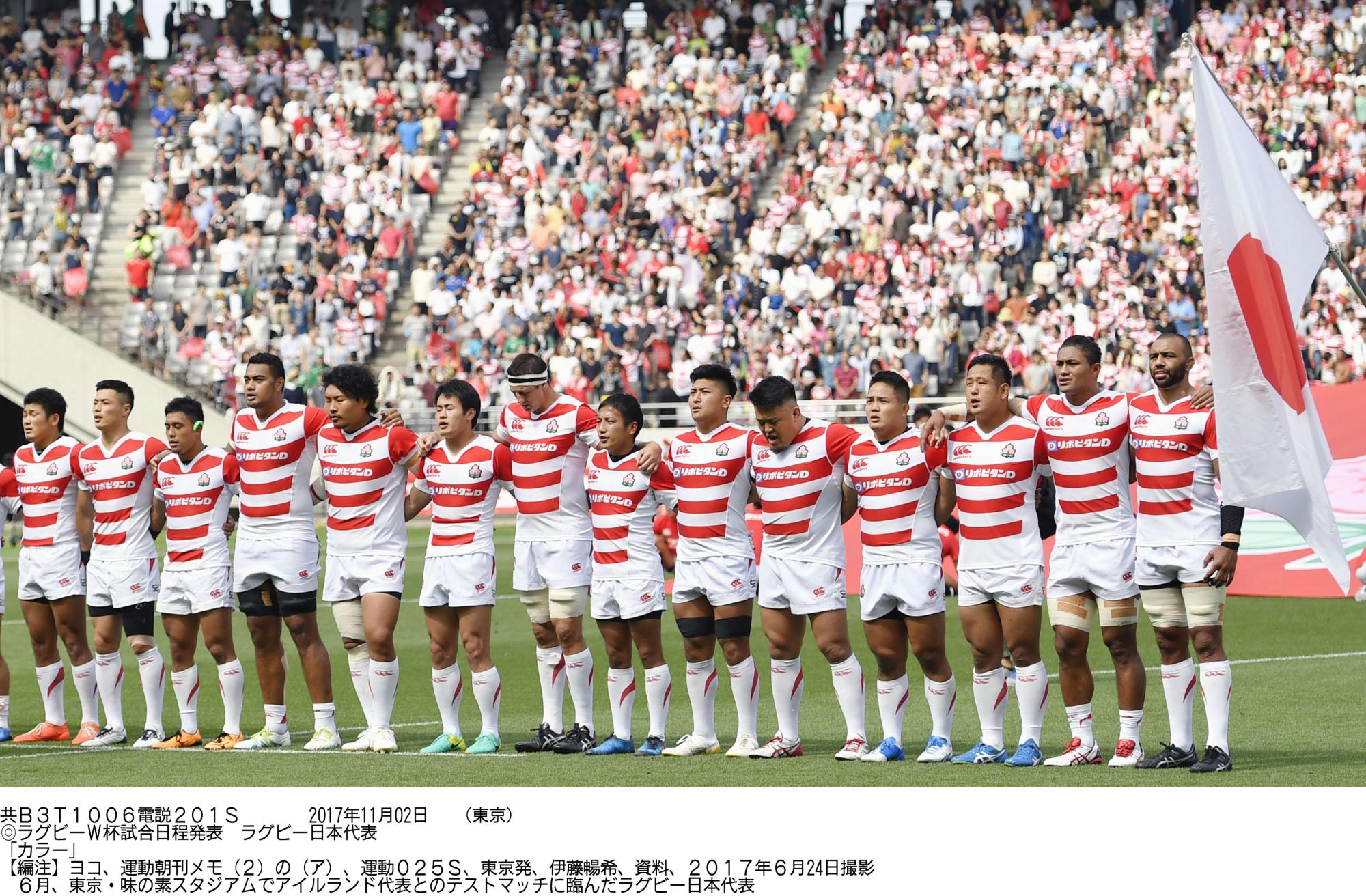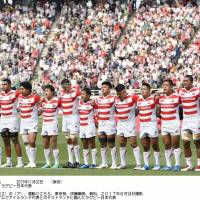Japan will play the winner of the European qualifying competition in the opening game of the 2019 Rugby World Cup at Tokyo's Ajinomoto Stadium on Sept. 20, as organizers announced the full tournament schedule on Thursday.
[video_embed number="1"]
The Brave Blossoms, who will be bidding to reach the knockout stage for the first time, will then face Ireland in Shizuoka on Sept. 28 before taking on the winner of the qualifying playoff in Toyota, Aichi Pref., on Oct. 5, and Scotland in Yokohama on Oct. 13.
The identity of the European qualifier — either Romania, Russia, Spain, Germany or Belgium — will be determined by next year's Rugby Europe Championship from February to March. The playoff qualifier will be decided next June.
"Seeing the schedule gives us certainty in terms of where the games are going to be played and who we're going to be playing and at what time," said Japan head coach Jamie Joseph, whose team plays Australia in a test match in Yokohama on Saturday.
"So that's really exciting because it feels like the World Cup is drawing nearer. It allows us to start our planning in more detail now."
Japan famously beat South Africa in its opening game at the 2015 World Cup but then lost to Scotland next time out with only four days to prepare between matches.
"Last time we played against Scotland after only a four-day break and it was pretty tough," said Japan prop Kensuke Hatakeyama. "This time we have a week, so I think we'll be able to recover and be in the best condition to play."
Organizers for the first Rugby World Cup to be held in Asia unveiled the full tournament schedule with a lavish presentation at a Tokyo hotel, six months after holding the group-stage draw in Kyoto.
[video_embed number="2"]
Twelve venues around Japan will host matches. The final will be held at Nissan Stadium in Yokohama on Nov. 2, with the semifinals taking place on Oct. 26 and 27 at the same venue.
The third-place playoff will be held at Ajinomoto Stadium on Nov. 1. Oita and Tokyo will host two quarterfinals each on Oct. 19 and 20.
"This is the day that teams and fans around the world have been waiting for since the pool draw," said World Rugby president Bill Beaumont. "The moment that the tournament truly comes alive. The moment that they can start to plan for Asia's first Rugby World Cup."
Defending champion New Zealand will open its campaign against South Africa in Yokohama on Sept. 21, before facing the winner of the qualifying repechage in Oita on Oct. 2, the winner of the African qualifying competition in Tokyo on Oct. 6, and Italy in Toyota on Oct. 12.
England will begin against Tonga in Sapporo on Sept. 22 before playing the United States in Kobe on Sept. 26, Argentina in Tokyo on Oct. 5, and France in Yokohama on Oct. 12.
Two-time champion Australia will begin its campaign against Fiji in Sapporo on Sept. 21, while Wales will open against Georgia in Toyota on Sept. 23.
"We have worked hard to deliver a match schedule that improves on the Rugby World Cup 2015 model, delivering a more balanced spread of matches across the four weeks of pool matches and greater rest periods for the emerging rugby nations ahead of matches against the top-ranked teams," said World Rugby CEO Brett Gosper.
"These are the foundations that will assist the world's top players to perform to their best in Japan."
Organizers also unveiled the tournament ticketing program, with adult tickets starting from ¥2,019 and children's tickets starting from ¥1,000. The most expensive tickets for the final will cost ¥190,000.
Phased ballot ticket sales will begin on Jan. 19, 2018 at 10 a.m. Japan time via the official 2019 Rugby World Cup ticketing site, tickets.rugbyworldcup.com, with bundle tickets going on sale first. Two types of bundle tickets will be available for the competition's group stage — a set of tickets to watch a particular team and a set of tickets to watch games at a particular venue.
Around 1.8 million tickets are expected to be sold for the competition's 48 games.
"Everyone is welcome," said Beaumont. "This is reflected in an attractive ticketing program — the most accessible in modern Rugby World Cup history — providing 1.8 million opportunities for fans to experience one of the world's biggest and best-loved sporting events."




